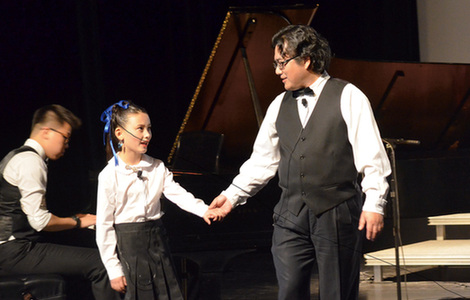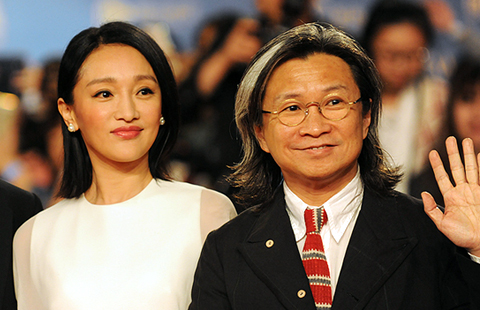Genetic editing of human embryo sparks an uproar
Updated: 2015-04-24 11:25
By Zheng Xin in New York(China Daily USA)
|
||||||||
A global outcry from scientists has arisen after Chinese scientists successfully "edited" the genes of human embryos for the first time.
Using embryos incapable of developing into a live birth obtained from a fertility clinic, a team led by Chinese scientist Huang Junjiu, associate professor of biology at Sun Yat-sen University in Guangzhou, succeeded in using cutting-edge technology to remove and replace a gene responsible for beta-thalassemia, a potentially fatal blood disorder.
Of the 86 embryos injected with the gene-alerting "tool", called CRISPR, 71 survived and of the 28 successfully spliced, a small percentage successfully accepted the replacement genetic material.
The authors of the study, which appeared in a little known online journal after being rejected by major publications on ethical grounds, admit that the procedure produced a "surprising number" of unintended mutations.
The study has caused an uproar among the scientific community over concerns that the study has jumped the gun with a powerful technology whose ethical implications have not been worked out.
With the enormous opportunities that come with engineering the human genome, also come unforeseeable hazards and potential havoc for the human gene pool, some believe.
"Despite that the full spectrum of risk is unknown, it includes introducing unwanted and potentially harmful defects in genes other than the one targeted for repair," said George Q. Daley, a stem cell expert and professor of biological chemistry and molecular pharmacology at Harvard Medical School.
"It would be distressing to cause one disease while attempting to erase another," said Daley in an email interview with China Daily.
Science writer Carl Zimmer also voiced concerns in a blog on National Geographic's website, saying the procedure could end up creating new disorders, as it tries to fix old ones, and missing the target and inserting new DNA could "create a disease of its own".
"It will raise enormous peril for humanity," said Daley, who is also director of the Stem Cell Transplantation Program Boston Children's Hospital & Dana-Farber Cancer Institute.
"To envision any future attempts at altering our gene lines, we would not only need to consider safety but also the social and ethical implications of altering the human gene line," he said.
British biologist Edward Lanphier is quoted in Nature addressing the necessity to "pause this research and make sure we have a broad-based discussion about which direction we are going".
The study used a gene-cutting-and-stitching "tool" known as CRISPR, which is potentially capable of removing disease from the human genome, as well as enhancing traits like intelligence and beauty.
The technique has been used in tests on human cells and animal embryos before, but it is the very first time that it is known to have been successfully used on human embryos.
"Despite representing a powerful technology with many valuable potential applications in biomedical research, it is not safe enough for clinical use over time yet," Daley said.
After being turned down by the prestigious journals Nature and Science over ethnical objections, the study was published in the open access journal Protein & Cell and Huang wrote there that they were aware of the controversy.
Advocates of gene editing say that it could eradicate devastating inherited diseases, but scientists call for a temporary worldwide ban on the use of CRISPR on human genes until the implications have been better examined.
Writing in Science last month, a team of scientists declared: "At present, the potential safety and efficacy issues arising from the use of this technology must be thoroughly investigated and understood before any attempts at human engineering are sanctioned, if ever, for clinical testing."
zhengxin@chinadaily.com.cn
- Are you prepared to welcome the second royal baby?
- Spain recalls Venezuelan ambassador over Maduro conspiracy comments
- Anniversary of Armenian massacre marked
- DPRK to establish 2nd intl tourist zone
- Parade rehearsal held for Victory over Fascism in Russia
- Kim likely to visit Russia in May for war victory ceremony

 Stunts, Parkour, Action!
Stunts, Parkour, Action!
 City starting to close gap with world fashion capitals
City starting to close gap with world fashion capitals
 Across America over the week (from April 17 to 23)
Across America over the week (from April 17 to 23)
 Honored for community work
Honored for community work
 5th Beijing International Film Festival closes
5th Beijing International Film Festival closes
 Top 10 auto lookalikes in China
Top 10 auto lookalikes in China
 Flights cancelled as ash cloud pours from Chile volcano
Flights cancelled as ash cloud pours from Chile volcano
 Unusual but true: Kung fu girl stuns TV show judges
Unusual but true: Kung fu girl stuns TV show judges
Most Viewed
Editor's Picks

|

|

|

|

|

|
Today's Top News
Ho Feng Shan: A man of compassion, courage
The real Apple Watch goes on sale Friday in China, US
China looks to top the bill in Hollywood productions
Panda to be inseminated via China
Chinese mourn passing of US officer
Sino-US nuclear cooperation proposal lauded
Furious 7 on track to be tops in China
As PayPal split looms, eBay plans to think small
US Weekly

|

|






